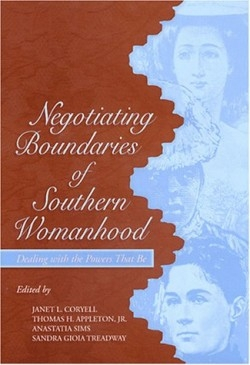
Negotiating Boundaries of Southern Womanhood
Dealing With the Powers That Be
Despite misogyny, patriarchy, and the established social mores of the pre- and post-Civil War South, there are women, whose lives are detailed in Negotiating Boundaries, who lived to the fullest extent possible in the space dictated by the local customs and laws. This academic collection of essays, each by a different female author, portrays women who worked within the rules to get what they needed to survive in nineteenth and early twentieth century Southern America. What the reader learns is how small this space actually was, and how hard women had to work for gender and racial equality.
The women in these essays are not famous and are little more than a name in a county tax or legal document. Despite a severe lack of diaries, personal papers, or anything that could illuminate a personality, each author fleshes out these names into real and struggling women using mostly legal documents.
In “Married Women’s Property Rights and the Challenge to the Patriarchal Order,” Angela Boswell shows how the Civil War destroyed the “cult of domesticity” for the women of Colorado County, Texas. With their men absent, it was acceptable for women to act outside the established business and social customs—to take care of the financial burdens of the home and family. When the defeated Confederates returned home, women were immediately stripped of their responsibilities. Texas was more liberal than other states in its laws concerning women. Married or not, women were considered a bad credit investment. Women could own land, but it was less to encourage the enfranchisement of women and more to shelter property during economic depressions.
In “The Extent of the Law: Free Women of Color in Antebellum Memphis, Tennessee,” Beverly Bond recreates the stories of real women, such as Milly Swan Price, a free woman of color who worked as a gardener. She eventually owned land and supported a household entirely on her own. The 1850 census indicates that Price owned five slaves, but, more than likely, she had purchased the freedom of and employed five relatives or close friends. Her generosity extended to her future husband Bob Price: she purchased his and his daughter’s (from a previous relationship) freedom. Yet, when she married Price, her status as femme sole became femme covert and all legal responsibility shifted to her husband, Bob, despite the fact that she had brought them into financial stability.
The most disheartening stories were in Michelle Krowl’s “Her Just Dues: Civil War Pensions of African-American Women in Virginia.” African-American widows were awarded the same pensions as white, but had to fight much harder for them, while suffering the same emotional loss. To receive her pension, Sophia Shears was required to prove in court, by gathering relatives’ and friends’ testimonies, that she was widowed and deserving of a pension. (Slave marriages were not recognized as valid in the majority of Southern states.) A widow’s reputation could “make or break her case, as many pension agents also prejudicially ascribed lower levels of morality to black female pensioners.” Sophia Shears had maintained “relations” with other men after the death of her husband, and was considered in bad moral standing. She lost her pension. Another problem was an overlapping claim to one pension, where two women claimed to be married to and supported by the same soldier. Each widow would have to prove the validity of her marriage. Only one would get the pension.
When the Civil War broke out, women were afforded more responsibility, similar to the female workforce that supported the WWII effort. After the war was over, women discovered that, despite their new sense of empowerment, there would be new laws for women concerning pensions, money and land—laws that would never undermine the patriarchy.
This collection is useful to the reader seeking specific, detailed, and well-researched stories that explain traditions, laws, and prejudice through the lives of individual women. Southern societal rules were clearly stacked against women, especially black women who had no stature in society prior to the War. A woman’s security was shaky because she was not seen as fit to support herself; a simple doubt of a woman’s moral fiber could endanger her pension. Many were dropped from the rolls this way and left to survive on their own.
Reviewed by
Kristin Putchinksi
Disclosure: This article is not an endorsement, but a review. The publisher of this book provided free copies of the book to have their book reviewed by a professional reviewer. No fee was paid by the publisher for this review. Foreword Reviews only recommends books that we love. Foreword Magazine, Inc. is disclosing this in accordance with the Federal Trade Commission’s 16 CFR, Part 255.
